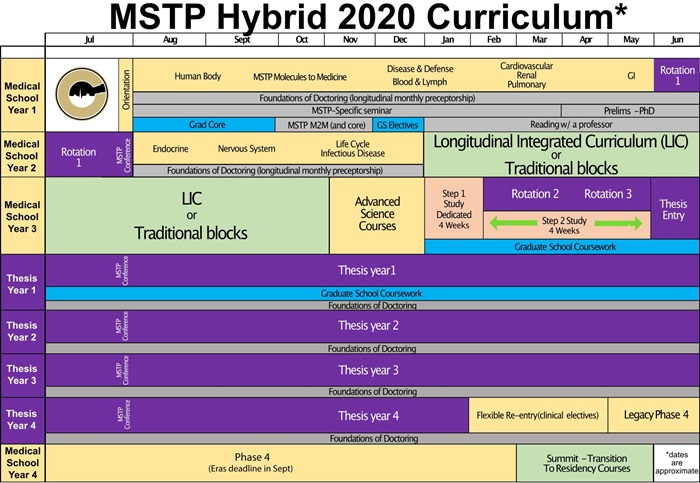
This information is for the MSTP students who matriculated to CU MSTP in the fall of 2020.
Medical School Year 1 - Includes didactic medical school courses over 3 semesters, while also taking MSTP-specific courses (Graduate School Core Course, MSTP Seminar and MSTP Molecules to Medicine)with their class peers. At the end of the first year, MSTPs will spend their summer in their first lab rotation. Students will be advised by the MSTP Director and Pre-Clinical Associate Director to help choose a MSTP faculty lab to rotate with. Students will be able to rotate in a lab on any campus – Anschutz, National Jewish, or Boulder.
Medical School Year 2 – Students enter the Longitudinal Integrated Curriculum (LIC Clerkships) for their clinical rotations. Students are placed at a hospital in the Denver area through a lottery conducted with the SOM Office of Student Life. Students will follow longitudinal structured clinical blocks. Unlike traditional clerkship blocks that do only surgery for 1 month and then move onto another clerkship, students in the LIC will have their surgery clerkship spread over half a year. This format will allow students to follow the patient through their clinical course, providing important information to each clinical team about the patient’s experience.
Medical School Year 3 – After completing their LICs, MSTPs will take the SOM Advanced Sciences Courses, also known as Integrated Complex Medical Courses, which will cover topics such as Neuroscience, Cardiovascular, Immunology, Cancer Biology. Students will also prep for Step 1, taking their exam before the end of the fall semester, getting ~4 weeks of dedicated study time. MSTPs will then prepare and take Step 2 shortly after the winter break before the end of January, before entering their second (and/or third) lab rotation. During the lab rotation(s), MSTPs will take additional MSTP courses/electives – Reading with a Professor and Grant Writing.
Thesis Years– MSTPs begin their thesis work in their PhD Program, taking additional program-specific graduate school courses as well as the MSTP Foundations of Doctoring course. MSTP-FOD allows students to work with a physician scientist preceptor of their choosing, to continue their clinical training. They should choose to work in the clinic (or inpatient setting) with an academic physician-scientist who specializes in a clinical area of interest. The year prior to returning to medical school, MSTPs will participate in a Clinical Capstone course uniquely designed to better prepare the students for success in the clinics. This may take the form of precepting in the wards, didactic seasons with advisors, or other resources. MSTPs average 4 years to degree and will have a flexible re-entry timeline to return to medical school between April and June, after meeting all their PhD Program and Thesis requirements.
Return to Medical School, post-PhD – MSTPs will return to the fourth and final phase of medical school after completing their required PhD work. Students will register for clinical electives to continue their training, prepare for their residency applications, ERAS letters, and interviews. The SOM offers Transition to Residency courses in the spring, prior to graduation.
Click HEREfor details on MSTP-specific courses.